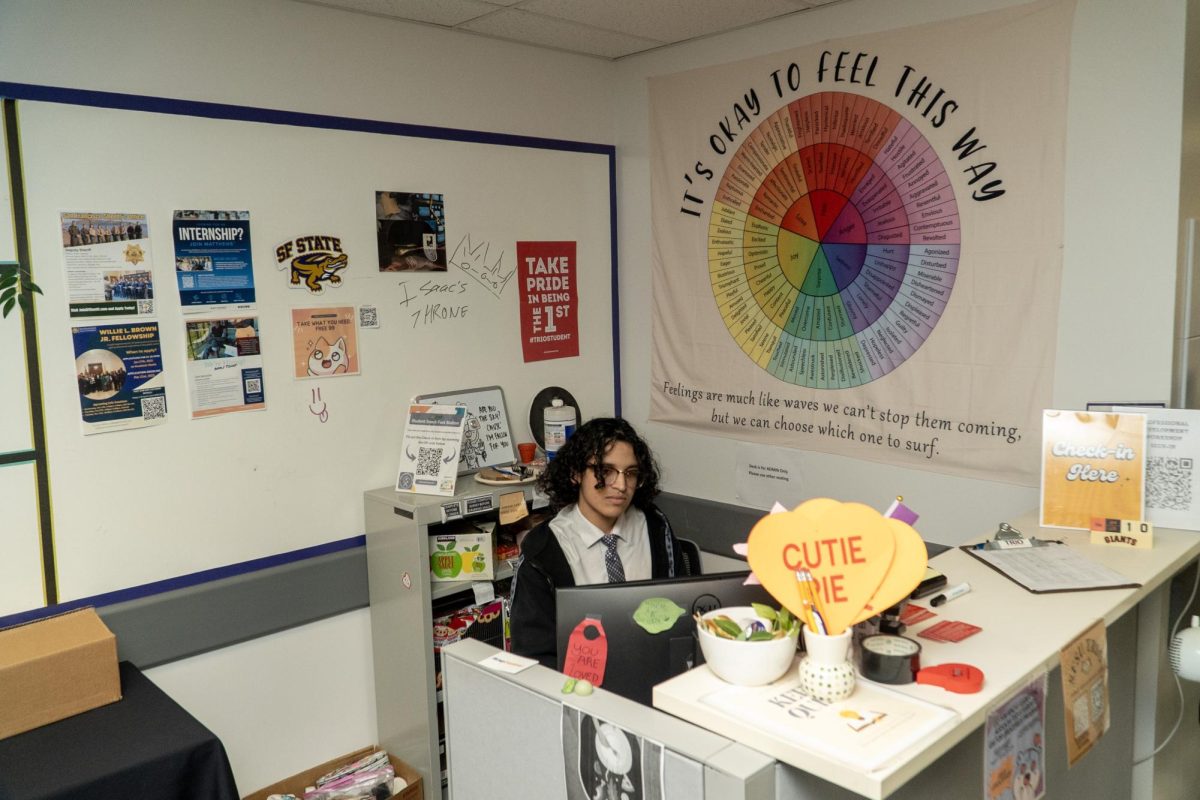Editor’s note: A previous version of this story alluded to the Oct. 25, 2005 arrest and jailing of an SF State professor as an example of a lawsuit against the Campus Safety Department for racial profiling. However, the conflict was instead resolved between the university and professor without further legal action, and a probe into the arrest found that the officers acted in line with UPD guidelines and were not “engaged in any racial profiling.” The story has been changed to reflect this.
Campus move-in day was in full swing, but the peaked pandemic dampened the usual anticipatory energy and foot traffic at SF State.
Ja’Corey Bowens was bridging toward another year in Africana Studies, was a resident assistant in an Afrocentric hall on Residential Life and was just getting involved with Associated Students at the time of the move. He parked his personal belongings by the door to the Village at Centennial Square, noting the campus security car that had trailed at a distance behind him, and went inside.
As an RA and staple member of ResLife, Bowens trusted his peers to watch his things while he retrieved his new dorm key and reconnected with friends missed in quarantine. When he returned outside for his things, rather than being met by his peers, he was stopped and questioned by a member of campus security.
The security guard asked what he was doing, to which Bowens explained he was moving to a new space on-campus. After questioning, the guard said there’d been ‘suspicious activity’ on campus, leaving Bowens feeling injured by the implication.
“That really hurt,” Bowens said. “There’d always be people on campus like walking their dogs or like people, just families from the community coming in. It’s like me, someone who actually works here and lives here and haven’t left, and I get stopped from going into where I live just ‘cause, like, I ‘look suspicious.’”
The rest of that summer was marked as San Francisco and other communities across the nation rallied in protest of historic and systemic brutalization of Black bodies by police departments across America, incited by the murder of George Floyd in police custody in May.
Now, Bowens is one of the loudest voices leading SF State’s initiative to defund campus police and reinvest in student resources and community safety programs. He co-authored a resolution for abolishing the University Police Department last year as chair of the Associated Students UPD Ad Hoc Committee with Lee Lockhart, vice president of AS Internal Affairs.
“[My experience] was terrible and like all these experiences were happening and it made me realize, okay, like there needs to be a conversation as to what is happening with residential life and UPD,” Bowens said.
Bowens’ experience is not an isolated incident on campus. The Division of Campus Safety has a history of accusations of racially profiling students and staff members, including the UPD arrest and jailing of an SF State Ethnic Studies professor in 2005, when he was stopped whilst retrieving books from his classroom after-hours. The conflict was later resolved between the professor and the university, and a probe by former City Attorney Louise Renne and former San Francisco Mayor Willie Brown into the incident found that the officers involved acted in line with campus protocol, and were not “engaged in any racial profiling.”
SF State has a checkered past with policing students of color, beginning with the campus strikes in 1968. Students protesting for an inclusive curriculum and equal admission rights for students of color, led by the Black Student Union and The World Liberation Front, were met with swinging batons and group arrests. Police arrested hundreds of demonstrators and injured scores more over the five-month strike, which resulted in the creation of the college of Ethnic Studies.
Among the safety features Bowens and Lockhart proposed as an alternative to UPD were increased investment toward Counseling & Psychological Services to meet the growing demand for mental health resources, sexual health education, trained crisis response professionals, decriminalization of addiction and student houselessness and accessible emergency housing for students in need.

Lockhart, former chair of the UPD Ad Hoc Committee, expressed concern that campus police are often called to housing lockouts and health emergencies.
According to SF State’s 2019 Annual Security Report, the most common incidents logged in campus police crime reports are liquor and drug law referrals, burglaries, rapes and reports of stalking.
“The biggest thing that police respond to right now is calls in ResLife, and it’s calls about like noise complaints or someone’s smoking and it’s like, do we really need someone, once again a militarized man with a gun, showing up to these places? The answer is no,” Lockhart said in an interview with Xpress.
Although SF State was ranked the fifth most diverse public campus in the country as of 2020, that diversity is not reflected in the makeup of its police departments, not counting additional security contracted by the Department of Campus Security through Apex Security Group, a third-party security company made up of off-duty and retired law enforcement officers.
Police Chief Reggie Parson of SF State’s University Police Department, an alum and sole Black member of the UPD, commented on proposed policy shifts to decrease police response to non-life-threatening emergency calls. Policies are being examined by the Public Safety Advisory Committee, whose goal is to promote safety as “an avenue to help the Division of Campus Safety understand campus community members’ experiences, needs, and perspectives,” according to the Vice President for Student Affairs & Enrollment Management website.
In February, Beth Hellwig, vice president of Student Affairs & Enrollment Management, led a short-term workgroup that influenced UPD policy to reduce campus police response to housing calls such as lockouts and noise complaints, Parson said. Such responsibilities after the policy shift would go to administration and ResLife.
Lockhart and Bowens both conveyed frustration that UPD had been slow to implement said changes. The UPD is currently gathering data to assess the efficacy of the changes so far, according to Parson. UPD is expected to publish its findings by the end of May, according to SF State Media Relations Specialist Kent Bravo.
The next step, said Parson, is pivoting to examine how campus police presence can be reduced on the main campus, and which scenarios can be better handled by specialized administrative staff.
“The ultimate goal is to really de-police and remove that impactful presence, as much as possible,” Parson said. “And really save it again for those situations which are life safety situations and in crime, because crime still does occur here.”
SF State is just one of many university campuses to be reevaluating its in-house police department, with conversations overlapping between California State University, University of California and California Community College campuses over the last two weeks. Most recently, Cal State Los Angeles’ Academic Senate passed a resolution on April 27 to begin reforming campus police, becoming the first school in the CSU system to do so.
Although developments on the AS UPD Ad Hoc Committee resolution in favor of UPD abolition have stagnated since its approval in July, the committee has continued conversations around Black Lives Matter initiatives on-campus and pushed for accountability within the SF State system, said Christine Amador, leadership development coordinator for AS.
At KQED and CalMatters’ April 21 “The Future of Campus Policing” event, which Bowens and Lockhard also attended, John Pérez, chair of the University of California Board of Regents, shared his own experience of being profiled, thrown to the ground and handcuffed without explanation by police in junior high.
Pérez, along with other campus law enforcement officials in attendance at the event, made the case for university police departments serving a decreased role on campuses and implementing system-wide standards for police responses to safety concerns.
“Yes, there’s always a need for safety in some ways,” Pérez said at the event. “But I think when you have an excessive presence, as we’ve had, and when you have it represent itself in the way that we’ve had, you actually inflame and don’t invite people in for conversation.”
Jason Bell, a lecturer in sociology and criminal justice studies at SF State, advocated in an interview with Xpress for the use of de-escalation techniques on campus and requiring those entering the criminal justice field to be educated in cultural competency beforehand.
“Anyone dealing with people should have exposure to cultural nuance,” he said.
Naomi Waters, vice chair of the UC Student Association’s Racial Justice Now Campaign, drew reference Wednesday to the origins of U.S. police as adapted slave patrols in the Jim Crow era. She presented that the abolishment of an “inherently anti-Black institution” would be necessary to create a safe environment for students of color.
“Community protects itself, and I feel like that’s what abolition or police abolition means, it means that we kind of have to take up this role of protecting ourselves and regulating ourselves without having an outside entity coming to do it,” said Nia Hall, SF State student and panelist at “Town Hall: Alternatives to Campus Police,” a separate event hosted by California Faculty Association and Students for Quality Education on April 23.
Hall referred to the Oakland Pilot Project, a new universal basic income initiative giving 600 low-income, POC families living in historically disenfranchised communities an unconditional $500 per month for at least 18 months. The goal of the project beyond community support is to “[build] momentum for strategies to eliminate racial disparities in economic stability, mobility, and assets through a guaranteed income,” according to the city of Oakland website.
In 2019, the city of Stockton implemented the Stockton Economic Empowerment Demonstration, a similar universal basic income program demonstrated success in alleviating financial strain and increasing opportunities for participants. According to an independent study conducted a year into the program, the 125 recipients of the $500 monthly stipend showed more stability in basic needs and experienced better physical, mental and financial health. Those who received the guaranteed income were also twice as likely to find full-time jobs than those who didn’t, according to the same study.
On April 16, San Francisco launched its own task force to develop a guaranteed income pilot program, estimating a monthly stipend of at least $500 for up to 1000 low-income city residents. The final report will be due to the mayor and San Francisco Board of Supervisors by Dec. 1, 2021.
“Safety comes from communities — it comes from people understanding struggles and people understanding what people are going through,” Lockhart said at the town hall event. “What makes people feel safe is having people who understand what they’re going through and a heightened sense of community.”
In an interview with Xpress, Lockhart expressed his belief that by abolishing campus police departments and transitioning to community-led safety programs, campuses can act as a model for what community safety can look like beyond them.
When asked what he’d like to share with students feeling apprehension about returning to campus, Parson encouraged them to be vocal about the changes they want to see made within the campus community.
“I think it’s okay to be in that space, you know, and as much as possible engage, you know, ask questions and concerns and bring concerns forward so we can hear them and you can be supported,” Parson said. “If there’s a curiosity or concern or question please ask, you know, but definitely don’t be silent.”














Tom • Apr 2, 2022 at 12:42 pm
This story is obviously very biased against police officers. It does not even go into what would happen if CSU schools got rid of campus police officers. If the CSU system were to do that, it would mean that there wouldn’t be much longer call response times for crime victims. It would mean city officers that do not know the nuances of campus life would be taking calls of service and detaining students. It would mean less specialized services for rape or domestic violence victims. Getting rid of campus police would probably have the opposite affect of what opponents of police want.
Jay • Jul 11, 2021 at 2:25 am
SFSU doesn’t even have campus security guards… I wonder if this incident happened with someone not affiliated with the university like Park Merced Courtesy Patrol. To me, it discredits the overall story. Aside from that, I believe in defending the police, not defunding.